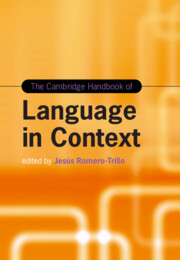Book contents
- The Cambridge Handbook of Language in Context
- Cambridge Handbooks in Language and Linguistics
- The Cambridge Handbook of Language in Context
- Copyright page
- Contents
- Figures
- Tables
- Contributors
- Acknowledgments
- Language in Context Studies
- Part I Language in Context: A Sociohistorical Perspective
- Part II Philosophical, Semantic, and Grammatical Approaches to Context
- 4 Philosophy of Language and Action Theory
- 5 A Functional Approach to Context
- 6 The Grammar of Incremental Language Production in Context
- 7 Cognitive Linguistics and Context
- Part III Pragmatic Approaches to Context
- Part IV Applications of Context Studies
- Part V Advances in Multimodal and Technological Context-Based Research
- Index
- References
4 - Philosophy of Language and Action Theory
from Part II - Philosophical, Semantic, and Grammatical Approaches to Context
Published online by Cambridge University Press: 30 November 2023
- The Cambridge Handbook of Language in Context
- Cambridge Handbooks in Language and Linguistics
- The Cambridge Handbook of Language in Context
- Copyright page
- Contents
- Figures
- Tables
- Contributors
- Acknowledgments
- Language in Context Studies
- Part I Language in Context: A Sociohistorical Perspective
- Part II Philosophical, Semantic, and Grammatical Approaches to Context
- 4 Philosophy of Language and Action Theory
- 5 A Functional Approach to Context
- 6 The Grammar of Incremental Language Production in Context
- 7 Cognitive Linguistics and Context
- Part III Pragmatic Approaches to Context
- Part IV Applications of Context Studies
- Part V Advances in Multimodal and Technological Context-Based Research
- Index
- References
Summary
Language is paradigmatically a human activity, largely consisting of speakers saying things in order to inform, warn, misinform, threat, sell, and so on. Language is important because it is a system for doing things. This suggests that the philosophy of action should be a part – a very important part – of the philosophy of language. To a certain extent it is. And, in consequence, the focus has moved from sentences to utterances. It has moved, but not entirely. Not because philosophers and logicians are unaware of utterances, but because the working assumption is that semantics should focus on what all utterances of an expression or sentence have in common, due to meaning, and not on how they differ, due to the particular facts of the utterance. In this chapter we first consider how this assumption has been challenged and express some reservations about alternatives. Then we turn to our own theory, the reflexive-referential theory, which takes utterances as basic to the semantics and pragmatics of natural language.
- Type
- Chapter
- Information
- The Cambridge Handbook of Language in Context , pp. 95 - 115Publisher: Cambridge University PressPrint publication year: 2023

